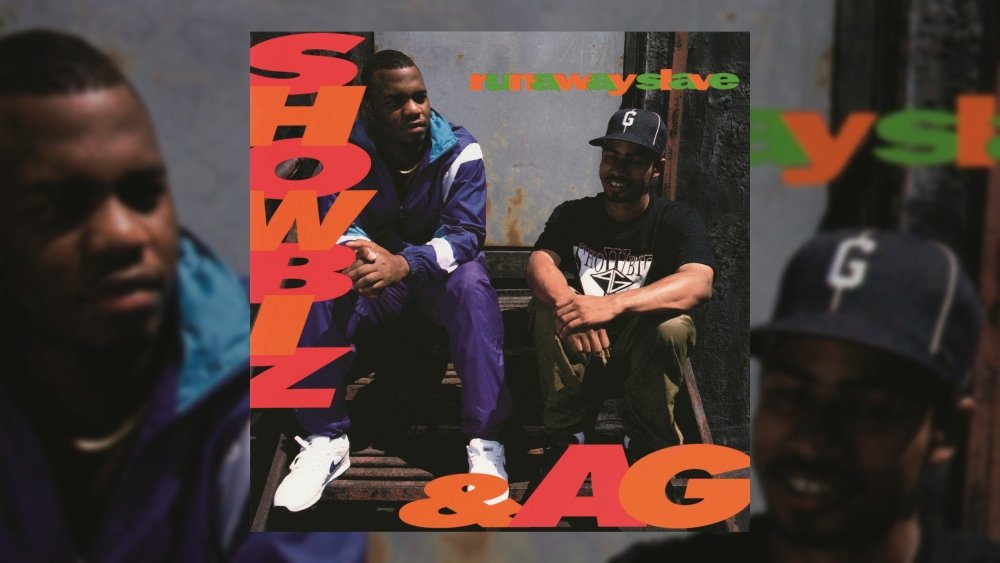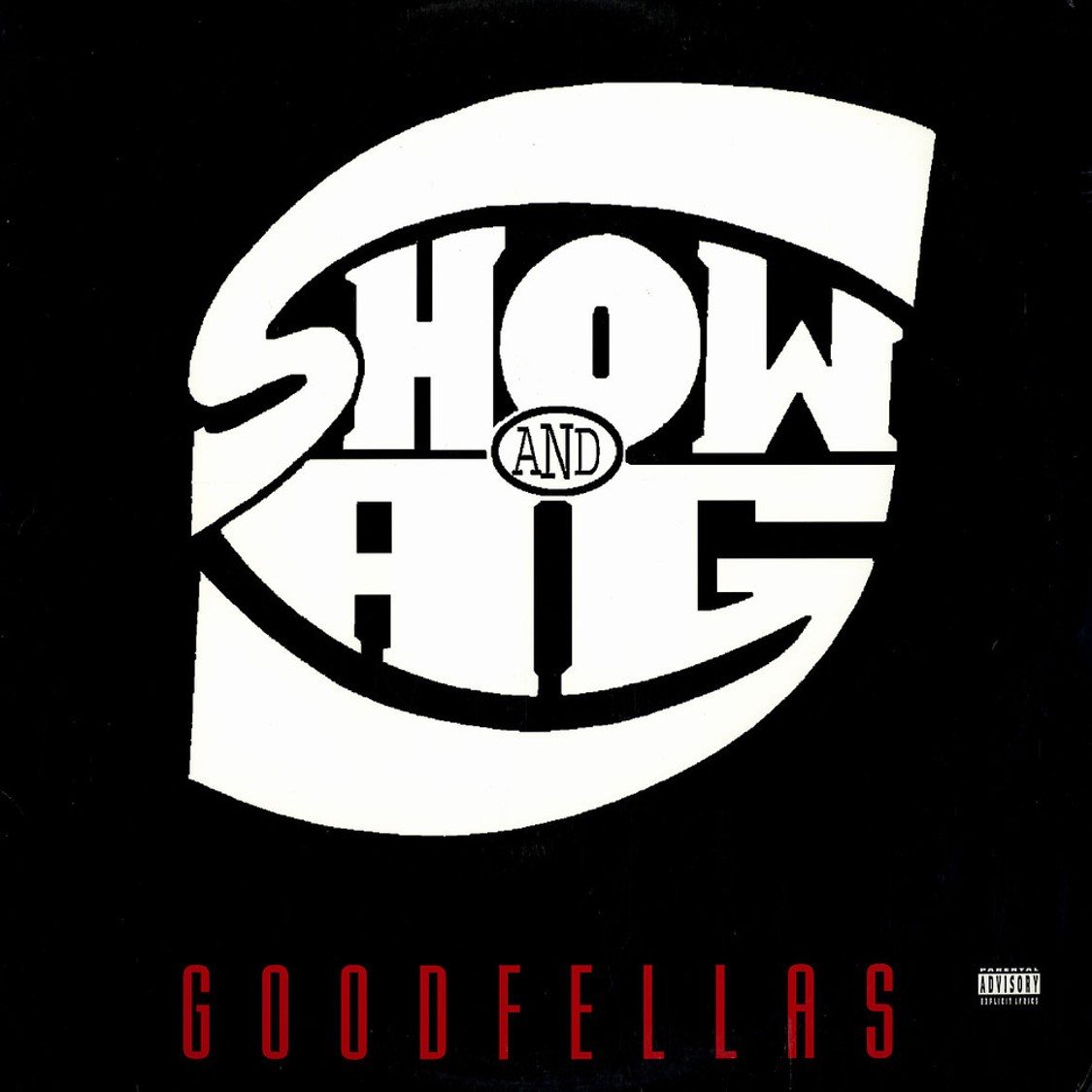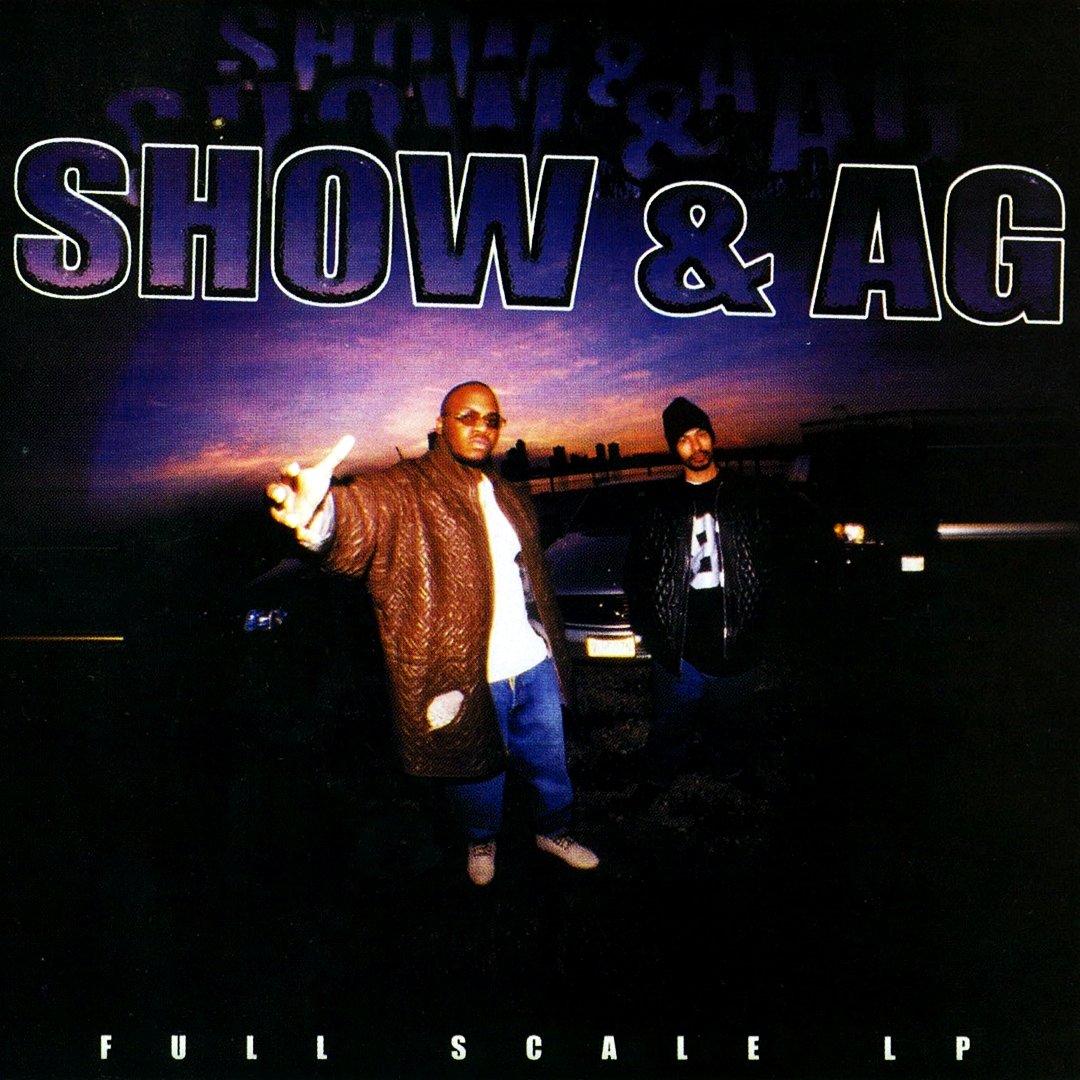Happy 30th Anniversary to Showbiz & A.G.’s debut album Runaway Slave, originally released September 22, 1992.
The year 1992 was at the dawn of a golden age of sample-based hip-hop production. The beat-makers in the genre were really moving beyond just using James Brown records and Ultimate Beats and Breaks compilations as the musical inspiration for emcees to showcase their skills.
As the key architects and purveyors of the era’s sonic innovation, New York-based producers Pete Rock, DJ Premier, and Diamond D have earned their due respect for their production wizardry. But one producer that is frequently overlooked is Rodney “Showbiz” LeMay. Showbiz began to earn his stripes as the ’90s began, and by 1992 he stood shoulder-to-shoulder with the best of his class. This was in no small part due to his musical partnership with Andre “Andre the Giant (a.k.a. A.G.)” Barnes, which was first formally cemented with the release of the duo’s debut album Runaway Slave album 30 years ago.
The Bronx-born and raised tandem came up with fellow artists Lord Finesse, Diamond D, Fat Joe, and Big L. In 1990, Showbiz produced two tracks on Lord Finesse’s debut album Funky Technician, with A.G. contributing a pair of verses as well. The duo then released the Soul Clap EP in 1991, which featured the first appearance of the title track that would become their best-known song. Buoyed by an undeniably funky bassline, sampled from the JBs’ “More Peas,” the Diamond D-produced banger became a mainstay on New York late night radio and within the city’s clubs.
Besides the title track, the instrumental “Party Groove,” and a pair of other tracks, the EP also featured the song “Diggin’ In The Crates,” a posse cut featuring verses from Showbiz, A.G., Diamond D and Lord Finesse. That song become the foundation of the crew of the same name, often abbreviated to D.I.T.C. All involved become known for their sharp mic skills and their diligent work ethic as producers and top-notch beat diggers. Reluctant to simply recycle the tried-and-true sample sources culled from more recognizable ’60s and ’70s records, the D.I.T.C. collective opted instead to get their fingers dusty by unearthing grooves and sounds sourced from more obscure jazz, soul, and rock records.
Showbiz & A.G. signed with London Records/Payday soon after releasing the successful “Soul Clap.” They re-released a re-worked version of the EP, Party Groove/Soul Clap in the spring of 1992, which featured most of the songs on the first EP, plus a vocal version of “Party Groove” and the track “Catchin’ Wreck.” The EP was set up to be an appetizer for the Runaway Slave full-length, which dropped about six months later.
Fueled by an inescapably jazzy vibe, Runaway Slave is one of the best hip-hop albums ever recorded. Showbiz and A.G. and the rest of the D.I.T.C. crew were not the first to build beats around jazz samples, as groups like Stetsasonic, Gang Starr, A Tribe Called Quest and Pete Rock & C.L. Smooth had all used a jazz-tinged palette to create all-time great albums. Runaway Slave has a similarly strong jazz aesthetic, with Showbiz bolstering free-flowing, swinging, early ’60s jazz records with solid, neck-snapping drums.
Watch the Official Videos (Playlist):
The aforementioned Pete Rock was known during this era for his horn-driven sound, but Showbiz gives him a serious run for his money on Runaway Slave. The horn samples used here anchor but don’t overpower the tracks. Furthermore, Showbiz has a keen ear for basslines, often using their vibrant low-end to complement the understated brass.
On the lyrical-side, A.G. carries much of the weight, functioning as the primary emcee and doing much of the narrative heavy-lifting on the album. However, Showbiz proves himself to be a capable emcee in his own right. While neither are typically regarded as the strongest emcees of this era, they certainly mesh seamlessly with the album’s soundscape.
The tracks on Runaway Slave all possess a decidedly non-commercial feel. Of the new material recorded for the album, little if any of it would be considered as fodder for radio play. It’s raw “street” hip-hop made for headphones, boomboxes and car stereos, but not designed for pop appeal.
Case in point, “Fat Pockets,” with its shifting drum patterns, plucky bassline, muffled guitar licks, and spare horn breakdown, is about as unconventional of a lead-off single as was spawned from that era. It’s not surprising that the song was drastically remixed for its video release. The album’s second single, “Bounce Ta This,” is about as close to accessible as Runaway Slave gets. The track features A.G. trading verses with Dres of Black Sheep, fresh off the monstrously success of “The Choice is Yours,” each flowing their stream-of-consciousness rhymes over a cowbell rhythm and meandering horns.
Runaway Slave even opens in a fairly odd manner, starting with “Still Diggin’,” the ostensible sequel to “Diggin’ In the Crates.” The song features verses from Showbiz and Diamond D, with Diamond kicking the first verse on the album. He starts off strong with, “See I'm back on the block but my name ain’t Quincy / Yeah, I’m chopping rappers up into mincemeat / Step up and speak if your shit ain’t weak / The beats for the jeep, kid, they don't come cheap.” Showbiz also comes correct to begin his own verse, rapping, “It’s often said, but it’s never read / That Diamond got a beat for every dread in his head / But don’t be misled, ’cause breakbeats are dead / I’m not the Biz, who runs around with Super Pro Keds.”
A good chunk of Runaway Slave features conscious rhymes aiming to reflect the grim realities that both Showbiz and A.G. faced growing up in the Bronx. Additionally, the pair explores ways to rise above the circumstances that surrounded them in order live positively. Songs like “Hard to Kill,” the Diamond D-produced title track, and “Hold Ya Head” depict the urban blight and real danger of death that the duo faced in the streets every day. Both Showbiz & A.G. depict in vivid detail how even just surviving in these circumstances can be considered a victory.
On the autobiographical “More Than One Way Out of the Ghetto,” A.G. explains his rise and fall and rebirth with one marathon 56-bar verse. Over a sparse trumpet and reverberating bassline, he chronicles being drawn to rap, but then forsaking it for the pursuit of fast money in the drug game. After doing a bid in prison, he faces desperation, lamenting, “I pursued the wrong dream / Now to make a fast buck I gotta scheme.” However, he soon learns from the mistakes that he’s made and rededicates his life to hip-hop music.
But even escaping the streets, Showbiz & A.G. concede that they still face a different set of issues while operating within the music industry. With “40 Acres and My Props,” the duo describe the various difficulties that they faced while working with the label to release their music, dodging potential landmines and finding a way to build a productive relationship with an institution that’s constantly trying to find ways to take money from you.
Runaway Slave does have its share of straight lyrical braggadocio. The album features “Silence of the Lambs” and its remix, where Showbiz and A.G. both go for broke over solid yet understated tracks. Both are in fine lyrical form, with A.G. rapping, “I'm undisputed even when I’m Buddha-ed / So act like Bo Jackson after surgery and don’t do it / Yapping? Diss A.G.? it won't happen / While your jaws are flapping, it's your girl that I'm tapping.”
The album moves away from its low-key feel with “Represent,” a rugged guitar-driven track featuring beastly verses from A.G., as well as a few guests. The track features one of the first recorded verses from the late great Big L. The Harlem-born legend leads off the track and tears into the mic, rapping, “Yo, on the mic is Big L, that brother who kicks flav, God / Known for sending garbage emcees to the graveyard / I pack a gat and not a slingshot / Step to this and get an ass-whooping like Rodney King got / Or get beat to your death like Cochise / My laws is no peace, fuck the police / Emcees be bragging about cash they collect / But them chumps is like Ray Charles, ’cause they ain't seen no money yet.”
The track also features a solid verse from DeShawn and another nearly scene-stealing contribution from Lord Finesse, who raps, “I make papes off the shit I create, and then dictate / So get your motherfucking shit straight / I got skills and I’m hard to kill / So y’all bitch-ass rappers better chill and just guard your grill / Y’all grab a mic and always getting hype / Talking bout fucking n&#%as up when you can barely beat your dick right.”
Enjoying this article? Click/tap on the album covers to explore more about Showbiz & A.G.:
The album concludes with four of the previously released tracks that appeared on the Party Groove/Soul Clap, including “Soul Clap,” instrumental and vocal versions of “Party Groove,” and “Catchin’ Wreck.” The inclusion of this four-song appendix helps contrast the duo’s roots with how they’ve progressed, celebrating their past while showcasing their present and future.
Showbiz & A.G. remained reasonably active after releasing Runaway Slave, and have continued to release quality product. Arguably the most memorable is their sophomore album Goodfellas, released in 1995. One notable change the duo went through is that after Runaway Slave, Showbiz retired from rapping, focusing his efforts toward cultivating his expertise behind the boards.
The pair have remained quite involved in recent years, as in 2017, they dropped the album Take It Back, an LP that celebrates the vintage sound that they helped create three decades ago, while still standing on its own as dope music. But that shouldn’t be a surprise, because if there’s one thing that Showbiz & A.G. have learned over the last 30 years, it’s that their refusal to compromise their sound has always been the key to their artistic and musical success.
LISTEN:
Editor's note: this anniversary tribute was originally published in 2017 and has since been edited for accuracy and timeliness.



